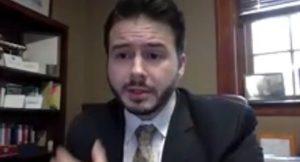Who is a member?
Our members are the local governments of Massachusetts and their elected and appointed leadership.

Easton Town Administrator Connor Read gives an overview of his town’s PFAS contamination response during a July 21 MMA webinar on the topic.
More than 175 municipal officials and employees attended an MMA webinar today on per- and polyfluoroalkyl substances, also known as PFAS or “forever chemicals.”
The session covered the human and environmental health implications of PFAS; the state’s regulations regarding testing and detection in drinking water; treatment options and sources of funding; local case studies and experiences with PFAS contamination; and information about the Legislature’s PFAS Interagency Task Force.
The House chair of the task force, Rep. Kate Hogan of Stow, gave welcoming remarks, sharing her experience as a legislator representing the town of Hudson, one of the first communities in Massachusetts to identify PFAS in its drinking water. Hogan discussed the task force’s mandate to develop a comprehensive report with recommendations by the end of 2021.
Wendy Heiger-Bernays, a professor of environmental health at Boston University and chair of Lexington’s Board of Health, discussed her perspective from being involved in the establishment of the state’s drinking water standard for PFAS. Heiger-Bernays explained the state’s standard and the health implications of exposure to PFAS chemicals through drinking water and other sources.
Kyle Hay, a licensed professional engineer with Weston & Sampson, gave an overview of methods used to remediate PFAS contamination in public water supplies. He also shared a case study of a treatment system he helped design and implement in Devens, at the site of a former U.S. Army base.
Easton Town Administrator Connor Read spoke about his community’s experience with PFAS contamination in the public water supply. He described decisions that needed to be made around short- and long-term treatment options, providing alternative sources of drinking water to residents, and the importance of public communications.
Read is the MMA’s designee on the PFAS Interagency Task Force and presented to the task force on July 20 as part of a hearing on municipal impacts from PFAS.
The MMA webinar was moderated by Cohasset Select Board Chair Diane Kennedy, secretary of the Massachusetts Select Board Association.
PFAS are a family of synthetic chemicals used since the 1950s to manufacture stain-resistant, water-resistant and non-stick products, such as food packaging, outdoor clothing, carpets and leather goods. PFAS are water soluble and releases can seep into surface soils, where they can leach into groundwater or surface water, and can contaminate drinking water. PFAS stay in the environment for a long time and do not break down easily. Studies indicate that exposure to sufficiently elevated levels of certain PFAS may cause a variety of health effects.
Questions can be directed to MMA Legislative Analyst Ariela Lovett at alovett@mma.org.
• PFAS 101: Per- and Poly-Fluoroalkyl Substances – Wendy Heiger-Bernays presentation (14M PDF)
• PFAS Response on The Local Level – Town of Easton presentation (3M PDF)
• PFAS Treatment Options and Case Studies – Weston & Sampson presentation (5M PDF)